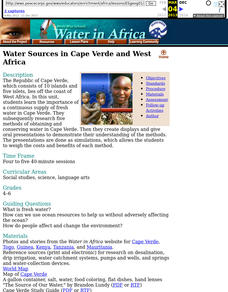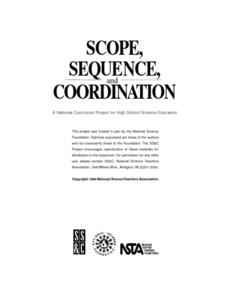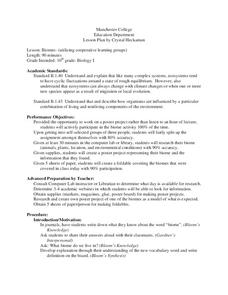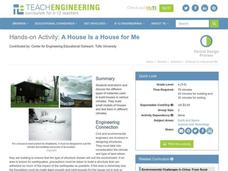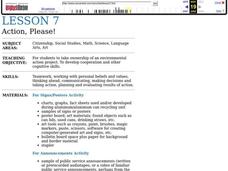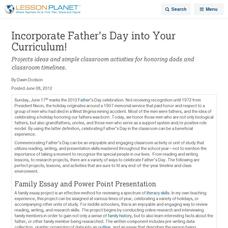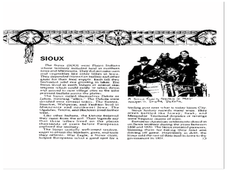Curated OER
Honing in on Hummingbirds
Young scholars explore ruby-throated hummingbirds. In this cross-curricular hummingbirds lesson, students listen to the book The Mystery of the Missing Hummingbirds and choose related topics to research with a partner. Young scholars...
Curated OER
Park Brochures
Sixth graders investigate natural environments by researching national parks. In this brochure making lesson plan, 6th graders explore a specific national park and research it's information by utilizing the web. Students create travel...
Curated OER
Genetics Research Paper & Presentation
Pupils review their information on genetics. Using PowerPoint, they present their findings to the class on the principles of genetic diseases and disorders. They discuss bioethics and identify the positives and negatives of genetic...
Curated OER
Prairie Mural Project
Seventh graders construct a large mural of a praire showing plants, and animals that would live there.
Curated OER
Water Sources in Cape Verde and West Africa
Young explorers study the scarcity and importance of a continuous supply of fresh water in Cape Verde. They research the five main ways that fresh water is obtained in these countries. Each research group prepares a presentation, and...
Curated OER
A Quest for Author Importance
Class members discover information about an author through a WebQuest and a brochure project.
Curated OER
Structural Factors in Evolution
Laboratory activities encourage evolutionary biology scholars to consider homologous structures as evidence of common ancestry. They learn how to formulate phylogenic trees and that environment influences to genetic variation. Activities...
National Wildlife Federation
Citizen Science to the Rescue!
You don't have to be a scientist or even out of high school to contribute to scientific research. In the 12th lesson in the series of 21, scholars use this opportunity to add to the growing body of scientific knowledge and consider the...
Curated OER
The Beginning of the War -- Two Views on Texas
Young scholars discuss the factors that can lead to war, and the motivations of countries going into war. They research two viewpoints on Texas during the Mexican War and participate in a debate with their classmates.
Curated OER
Cold and Warm Blooded Animals
Students research facts about a cold or warm-blooded animal in order to designa report either as PowerPoint or word processed document. They use online resources and insert images in to the report. They include the specified criteria and...
Curated OER
Hazardous Chemicals? Not in my Water!
Students reflect on the effects of their actions on the environment. In this community service lesson, students investigate the hazardous quality of products within their homes. Student educate their families and communities about the...
Sea World
Shark!
Is that a shark? Here's a 10-lesson unit that will have learners expanding their definition of what a shark actually is as they examine different features, habitats, and diets. They explore endangered species, using information cards...
Curated OER
Biomes
Tenth graders research locations of biomes and their barriers. In this biomes lesson, 10th graders examine location, environmental conditions, and species of plants and animals that live in the biome. Students take notes and create a...
Curated OER
City, County, Community
Students explore issues and situations that make for a city and its local environments. In this local government activity, students design maps, define issues and create brochures that illustrate their understandings of these concepts...
Curated OER
Hands on Biome-Building
Learners explore Earth science by participating in an environment activity. In this biome lesson plan, students discuss the importance of a healthy ecology in order to sustain life, both animal and plant. Learners utilize a cardboard or...
Curated OER
A House is a House for Me
Young scholars evaluate the impact climates have on the building of structures. They research the different types of materials used to build houses in various climates and build small models of houses which are tested against different...
Curated OER
Edible GMOs?
The debate over genetically modified organisms is on! Young biologists imagine that they have been asked to choose which corn chips will be sold for a fundraiser, one made with GMOs or one without. This four-day lesson plan requires...
Curated OER
Student News And Weather Channel
Fabulous! Your 5th graders should love this project. As an ongoing lesson throughout the year students use temperature probes to record outside temperature and then document their data using spreadsheets. They use their weather data and...
Curated OER
Current Sources of Energy to Maintain a Sustainable Future
In small groups, fourth graders identify different sources of renewable and non-renewable energy. They research the pros and cons of using each of these resources. They rank household appliances according to energy usage and efficiency....
Curated OER
Action, Please!
Students create an advertising campaign. In this environmental education lesson, students research aluminum and aluminum can recycling. Students wrap the lesson up by writing newspaper articles, creating public service announcements, and...
Curated OER
Incorporate Father's Day into Your Curriculum!
Projects ideas and simple classroom activities for honoring dads and classroom timelines.
California Polytechnic State University
Australian Geography Unit
At the heart of this resource is a beautifully detailed PowerPoint presentation (provided in PDF form) on the overall physical geography of Australia, basic facts about the country, Aboriginal history, and Australia culture and lifestyle.
Curated OER
People for the Land: Native Americans in Iowa
Students identify Iowa's American Indian cultures and complete a research project for the topic. In this Iowa's American Indian instructional activity, students research read the background information about tribes in Iowa and complete a...
Curated OER
Digging Up The Facts
Young scholars research environmental issues. In this environmental lesson, students use the Internet to research an environmental problem and list ten facts about it. Young scholars write a summary of facts.






